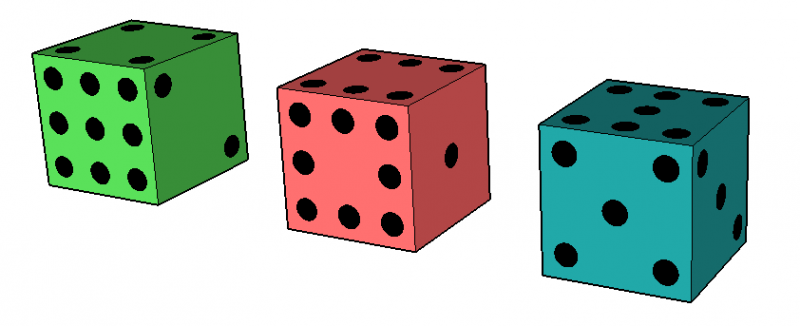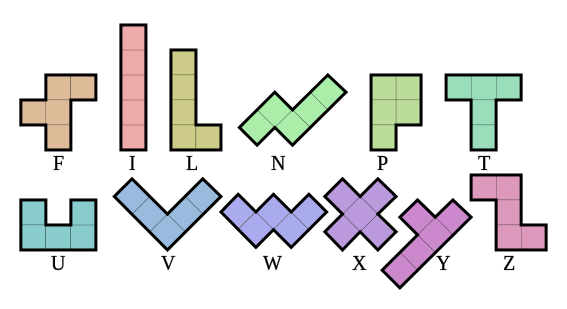Problems
Consider the following dice below:

That is, the green die on the left has sides \(2,2,4,4,9,9\), the red die in the middle has sides \(1,1,6,6,8,8\) and the blue die on the right has sides \(3,3,5,5,7,7\). In each of the dice, each side is equally likely to appear.
Imagine we both roll one die, and whoever gets the higher score wins. If I choose the green die, what die should you choose?
David and Eesa are playing a game with tossing a coin. They toss a fair coin until the first time that one of the following two sequences appears: \(HHH\) or \(THH\). If \(HHH\) appears first, then David wins. Otherwise, if \(THH\) appears first, then Eesa wins.
What are their chances of winning?
One hundred people are boarding on a fully-booked plane, and they all have assigned different individual seats. The first person has forgotten his boarding pass, so sits in a seat completely at random (that is, he’s equally like to pick any of the \(100\) seats). He might pick his own seat...but the most likely scenario is that he’ll pick someone else’s seat.
Then the second person will sit in their seat if it’s available. But if it’s taken, then they’ll sit in a random seat from those left available. Similarly the third person will sit in their seat if it’s available. But if it’s not, then they’ll sit in a random seat from those available. Each person from the second onwards to the hundredth follows these rules.
What’s the chance that the \(100^{\text{th}}\) gets to sit in their originally allocated seat?
Four mice are chosen (without replacement) from a litter, two of which are white. The probability that both white mice are chosen is twice the probability that neither is chosen. How many mice are there in the litter?
A flea hops about at random on the vertices of a triangle where each hop is from the currently occupied vertex of one of the other two vertices each with probability \(\frac{1}{2}\). Find the probability that after \(n\) hops the flea is back where it started.
A city planning committee contains a proportion \(p\) of members of the Even party, who never change their minds about anything, and a proportion \(1-p\) of members of the Odd party who change their minds completely at random (with probability \(r\)) between successive votes on the same issue. A randomly chosen committee member is noticed to have voted twice in succession in the same way. What is the probability that this member will vote in the same way next time?
A bin has \(2\) white balls and \(3\) black balls. You play a game as follows: you draw balls one at a time without replacement. Every time you draw a white ball , you win a dollar, but every time you draw a black ball, you lose a dollar. You can stop the game at any time. Devise a strategy for playing this game which results in an expected profit.
Take a (finite) set \(S\), say \([n]\) and a random function \(f:S\to S\). What’s the distribution of the limiting size of the image of the iterates of \(f\)?
That is, \(\lim_{N\to\infty}|f^N([n])|\)
By random, let \(i\in[n]\). Each \(f(i)\) is independently and identically distributed as uniform random variables on \([n]\). One can also think of it as \(f\) is taken uniformly from the \(n^n\) possible functions \([n]\to[n]\).
In the picture below, there are the \(12\) pentominoes. Is it possible to tile a \(6\times10\) rectangle with them, using each pentominoe exactly once?

Show how to tile a \(5\times12\) rectangle with the twelve pentominoes.